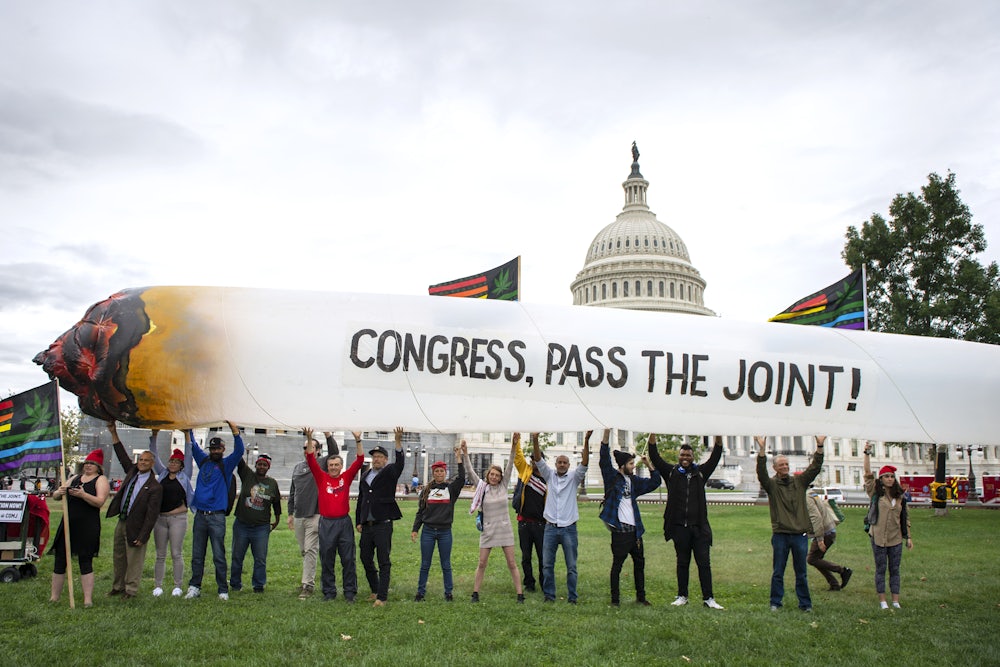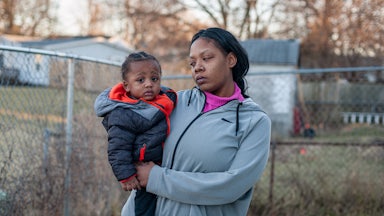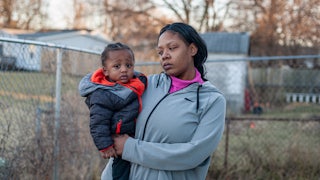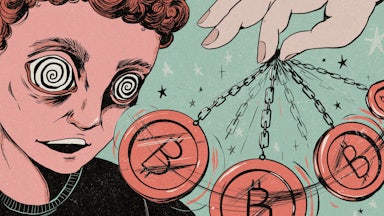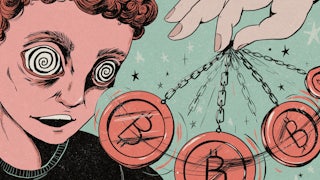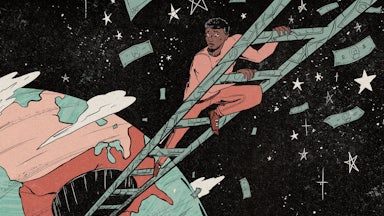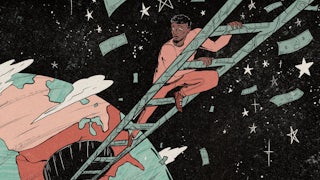To live in Washington, D.C., is to accept a series of undeniable truths: The temperature will drop from 70 to 30 in the span of a day, no single metro line will run for longer than a month without a disruptive service outage, and the political party ruling the U.S. Congress will always use D.C. as a bargaining chip to get what it wants—at the expense of District residents. For the better part of the last decade, that honor has belonged to Republicans, whose members have tried to gut Washington’s progressive gun laws, prevent students from learning about systemic racism, ban kids from sledding on Capitol Hill, and stomp out the city’s bid to enfranchise residents via its decades-long lobby for statehood. The final issue—that D.C. residents have no voting representation in Congress, and their local laws can be overturned by acts of Congress—underpins all of those efforts, including what House Republicans have described as a forthcoming plan to abolish D.C.’s elected government should they win back control of the chamber this fall.
Among the GOP’s most nefarious and successful attempts at meddling in local affairs is its refusal to permit local lawmakers to establish and regulate a recreational, adult-use cannabis market. Less than a year after D.C. voters overwhelmingly approved a ballot initiative to legalize pot in 2014, Maryland Representative Andy Harris, a Republican, introduced a budget rider to the 2015 spending bill that prevented D.C. from creating any regulation related to cannabis. The GOP has included that clause—known eponymously as the Harris Rider—in every federal budget since. For the last seven years, weed has existed in a regulatory limbo in D.C.: legal to possess, grow, and gift freely in small quantities but illegal to consume in public or sell.
So it was more than a mild surprise, coupled with a whiff of treachery, that rippled throughout D.C. last week when the Democrat-controlled Congress revealed its proposed federal spending bills. While the House managed to eliminate its riders, the version presented by the Senate kept them firmly in place. And when Congress passed the bill to prevent a government shutdown last week, it was the Senate’s version that won out.
“What’s the word … disappointed, let down, betrayed,” D.C. At-Large Councilmember Christina Henderson says of the bill, adding that councilmembers were passing around a fair number of frustrated emojis the morning the bills were introduced. The ban “just doesn’t make common sense. And I have to remind myself that legitimacy and common sense are not always what drive outcomes in Congress.”
The Harris Rider “strikes at the heart of what we’ve been trying to get ever since there’s been a District of Columbia,” says D.C. Delegate Eleanor Holmes Norton, a nonvoting member of Congress who has championed statehood during her 30 years in the House—“the equal treatment” of the city.
The shock was made all the more profound by the expectation that this would be the year things changed for D.C. Years of Republican control of Congress, then the White House, had worn on locals and lawmakers: Residents suffered an insurrection in their backyard, saw their city walled off and flooded with riot police they did not call upon during peaceful protests, and watched as anti-vaccine activists ran maskless through their city with glee. (Meanwhile, they heard Republicans argue that D.C. shouldn’t be a state because it would make parking at the Capitol more difficult and because it doesn’t have any car dealerships or landfills.) So by January 2021, when Democrats took a slim majority in Congress and Joe Biden took his oath of office, a city that is used to out-of-towners sticking their fingers in and swirling them around for fun had a little hope that it might soon be able to decide some things for itself.
With a president in the White House who expressed support for D.C. statehood and federal cannabis decriminalization, Mayor Muriel Bowser spoke with renewed enthusiasm about the prospect of the district becoming truly independent as the House voted for a second time to make D.C. the fifty-first state. Misguided or not, the catastrophes D.C. endured during the later months of Donald Trump’s presidency, followed by unprecedented grassroots support for the initiative, gave rise to a collective sense that statehood was an achievable goal. The D.C. Council held its first-ever public hearing last November on legalizing pot and began considering how it could regulate the gray market of cannabis gifting that has developed in the city since the 2014 ballot initiative passed.
The political situation just four months after that hearing is markedly different. On the morning that congressional leaders unveiled their spending bills, the mood in D.C. could be described only as like someone sticking a pin in a full balloon. The city didn’t just lose the chance to create a legal weed market—it also lost the hope that people on Capitol Hill might think differently about its right to do so.
Some lawmakers, like Norton and D.C. Council Chairman Phil Mendelson, still lay the blame solely at Republicans’ feet. “Clearly the dysfunction that exists in Congress means that they need Republicans on board to move spending bills,” says Mendelson, adding that he doesn’t blame Democrats for trying to move legislation. Norton notes that the House was able to easily eliminate the budget riders in its draft spending bill because the chamber has a more comfortable Democratic majority; it was a tougher sell in the Senate, where the party has less leverage.
They are nevertheless frustrated by what the Harris Rider means in practice for the city, where a robust market of cannabis gifting and delivery services has developed in the wake of residents’ 2014 vote to legalize weed—a market that the Harris Rider makes it illegal to regulate in any way, from banking to quality control and public safety. And that says nothing of the fact that residents can hop over the D.C. border to Maryland, home of Andy Harris and Republican Governor Larry Hogan, where lawmakers are in the middle of passing a framework to create a recreational weed market. In the city’s other neighbor, Republican Virginia Governor Glenn Youngkin, while skeptical of legalizing weed sales, has conceded that he isn’t interested in recriminalizing the drug.
“Democrats need to just get real clear and real serious. What is the party’s policy when it comes to cannabis? Because we have been nibbling around the edges with this hodgepodge patchwork system amongst the states, and all it takes, really, is one presidential administration with an overzealous attorney general who disagrees,” Henderson says. “This is incoherent. The Democratic Party has an incoherent message when it comes to cannabis policy.” (Mendelson is more blunt in his assessment: “Congress is dealing with this half-assed. Make it legal, make it illegal—not that I want them to make it illegal—but do something rather than this purgatory.”)
With the November midterm elections looming, there is the sense among lawmakers that this budget was the only meaningful chance this year that D.C. might be able to establish a cannabis market. Should Democrats lose their congressional majority, there is much more than just weed at stake. When the party controlled Congress in 2011, to take one example, it managed to strike a budget rider that prevented D.C. from using local funds to pay for a needle exchange program. Another long-standing rider—included in this year’s budget—bans the District from using local money to help people pay for abortions.
“We have a very small window right now. We don’t know what the fates hold for the House of Representatives. [And] we felt like this was an opportunity for D.C. to have the chance to be on the same level playing field as everyone else,” Henderson says. In a previous life, she worked as a legislative assistant for Senator Chuck Schumer, the top-ranking Senate Democrat. She is not blind to the political realities that shape the formation of a national budget. Still, she says: “I wish D.C. wasn’t always the expendable thing on the agenda.”
It’s as much a lament of the city’s status as it is a warning about its future: If Democrats don’t have a plan for D.C.’s independence, Republicans are all too happy to make one for them.
